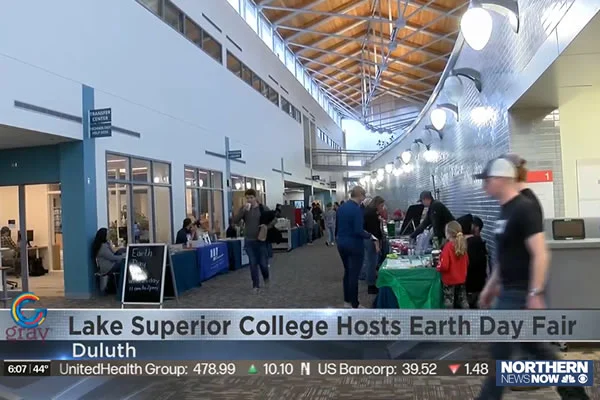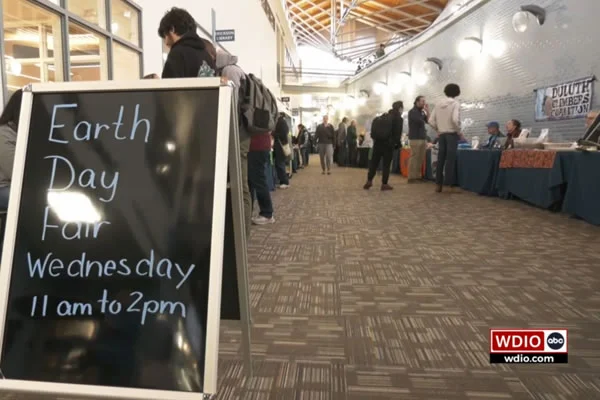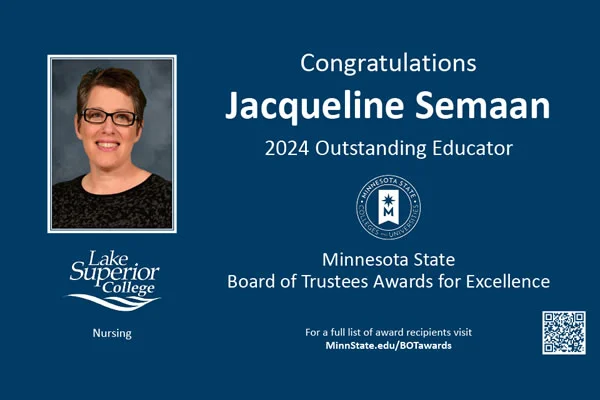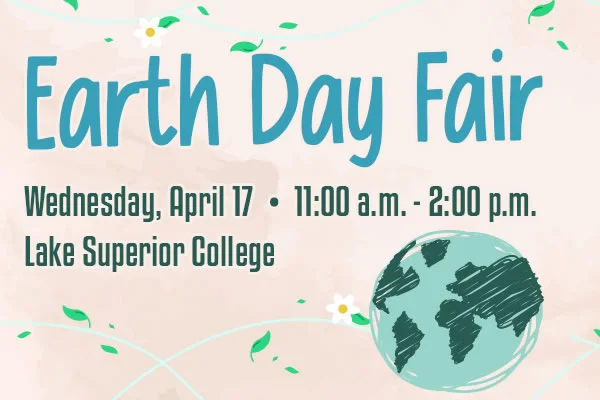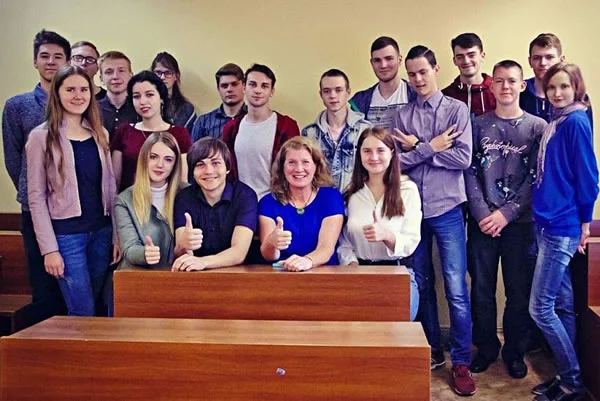
LSC English faculty Jocelyn Pihlaja served as a Fulbright Scholar in Belarus where she taught English for five months in 2018. Here is her own account about her extraordinary experiences in and out of the classroom in an Eastern European country.
- What does a Fulbright Scholarship mean to you? Did you have input on where you went to teach?
Receiving a grant as a Fulbright Scholar provided me with the opportunity to push myself professionally and get into different kinds of classrooms with different kinds of students. I’m very interested in education around the world and how it differs by culture. We talk a lot these days about “global education”; it has always seemed to me that if I truly want to be someone who lives as a world citizen with an awareness of what’s happening in other countries, I need to get out there and take a look. This is true with education, too. If I want to know what’s happening in classrooms around the world, I need to get into them.
When I applied for a Fulbright, I had to write a proposal pertaining to work I could do that would satisfy a need within a specific country, so that affected my choices of locations, as did the fact that more than 90% of Fulbright Scholars have PhDs and come from four-year institutions. I had to find a place that was willing to take someone with a master’s degree and a community college career.
Once I had a list of potential countries, I did some research and realized Belarus was a good choice because it’s engaged in a formal agreement with the EU called The Bologna Process (trying to Westernize higher education and align it with what’s happening in the rest of Europe – a move away from the traditional Soviet model). My Fulbright proposal, therefore, was aimed at how I could play a role in helping an institution achieve those goals. Also, living in a former Soviet republic had huge appeal, as I am fascinated by how various countries have adapted since the fall of the USSR. I wanted to see it for myself, with feet on the ground.
Overall, the biggest mission of a Fulbright
Scholar is to practice “soft diplomacy,” doing relationship building between
countries and cultures in a very intimate way, person-to-person. We were urged not to talk politics or push any agenda; rather, the intent of the Fulbright program is to create lasting connections and partnerships. My experience achieved that, for sure.
- How did you prepare for your teaching assignment? What ages did you teach and where in Belarus?
Before I left the U.S., I had contact with faculty at Polotsk State University about what I would be teaching: Extensive Reading for fifth-year Philology and World Languages majors and Writing for Social Media for fourth-year majors. I also knew I would be doing some informal work with clubs and the university’s language center, which is located on the campus in the neighboring city of Novopolotsk.
Forearmed with that information, I availed myself of the opportunity to send boxes of teaching materials through diplomatic pouch – books, games, etc. Once I arrived in Polotsk, which is a city about 225 km northeast of the capital, Minsk, I met my new colleagues and was oriented to the campus and the students. That said, there was no way I could have truly prepared myself for all that was to come; Belarusian language learners have a deep craving for interaction with native English speakers, so the teaching I thought I would be doing during my Fulbright time was only a small part of what I ended up doing.
In addition to my university classes, I also taught a lesson each week for the university language center (usually 3-4 combined groups of students); I went to a local gymnasium (a highly academic school) each week to work with gifted students who were training to compete in Language Olympiad meets; I occasionally acted as a facilitator in Speaking Club meetings at the university; I presented at conferences; I visited other gymnasiums in the region; and I guest-lectured occasionally in my colleagues’ classes at the university.
My hope was to say “yes” to everything, but I realized quickly that I needed to say no sometimes, lest I be overwhelmed. I had no idea how highly valued native English speakers are in Belarus and how I would constantly have people walking me home or on various errands, just so they could practice their English with me.
- Tell me about your domestic arrangements- did you live with a family or on your own? How did you manage the language barrier?
Fulbright Belarus participants always live on their own. When we arrive, we are shown choices of apartments either by a realtor or a university representative. Since I was in a smaller city, there were only two options for me to look at. I went with the bigger apartment (the other choice was a studio); it was located in the center of town, about twenty minutes’ walk from the university, right across from the arts center/library.
The primary language spoken in Belarus is Russian although Belarusian is taught in school and is used by some of the population. I was glad I started studying Cyrillic as soon as I found out I had been awarded the Fulbright. As well, I bought a workbook and made myself sit down with it for at least twenty minutes a day, along with using Duolingo every day. All of this was pre-departure preparation, and once I arrived in Belarus, I was grateful for every minute I’d spent learning to sound out words and memorizing basic vocabulary. Still, I was largely non-functional linguistically, unable to handle basic life tasks on my own (such as communicating with my landlord or finding baking powder in the grocery store). This feeling of powerlessness and being completely reliant on the kindness of others is something I wish every American had to experience, to be honest, because it teaches empathy and appreciation that we in the U.S., rolling easily through our comfy lives, are rarely asked to develop.
Without the continuous help of fellow English teachers, English students, and my fellow Fulbrighters around the country (they are English Teaching Assistants through Fulbright, and that program requires capability in Russian), I would have been stuck trying to mime “baking powder” to strangers. Certainly, much can be communicated through pointing and
gestures, and there are so many apps at our fingertips these days, but apps are limited in their ability, especially when it comes to abstract thought or casual speech. One time, I typed “It’s no big deal” into Google Translate and showed it to my landlord; after he read the translation, he shook his head and looked at me like I was crazy. Immediately, I realized: “big deal” is slang and would probably have been translated something like “major business transaction.”
Basically, I coped with the language barrier by learning new vocabulary, using apps, and, 97% of the time, having a native Russian speaker help me, either through messaging, phone calls, or being with me in person. Belarusians have a profound sense of hospitality and are complete care-takers; they treated it as an honor and a pleasure to assist me. Their graciousness is something I will never forget.
- You took a yoga class in Belarusian? What other funny experiences were memorable?
In addition to attending fitness classes three nights a week at the university, I went to yoga once a week with a warm and welcoming class of women; most of them didn’t speak English, but usually at least one could communicate enough with me to explain any “special plans” for that evening’s class. For example, one time, we did “partner yoga,” so I got up close and personal with the private parts of a woman named Sveta. We didn’t share a language, but I was able to appreciate that she was wearing underwear.
The day I was looking at apartments in Polotsk also forced me to tamp down giggles. I was with two women from the international office at the university, having met them about an hour before, and so I was trying to remain professional and composed. But when we walked into the second apartment – the one I ended up renting – I really wished for a good friend by my side so that I could dig my elbow into someone’s ribs. See, my landlord, Slava, had decorated the apartment to his exact specifications about ten years ago. He wanted it to be his perfect bachelor pad. With great pride, he showed off the Swarovski crystals embedded into the door handles, the raised and textured wallpapers covering the walls (including a Manhattan skyline in the closet that read, to the fingertips, like a kind of Braille), the “Wildcat Woman” art hanging on the wall, and the 15-foot mural that stretched across the entire living room ceiling. This mural was centered around a huge bereft-looking angel. Because I had no idea if every Belarusian apartment was decorated similarly, I didn’t want to show any “Whoa. Wow” reactions, so I went into the bedroom to hide my laughter and thought, “Oh, you better believe I’m renting the Sad Angel apartment.”
As the months went on, I featured Sad Angel heavily on social media, and she gained quite a fan base. As the months went on, as well, I became friends with the women from the international office and learned that they, too, had been taken aback by the apartment’s décor that day, but, like me, they’d tried to act like it was all normal. The good news is that, NO, not all Belarusian apartments are decorated like Sad Angel. Or maybe that’s bad news.
- What was the most challenging aspect of teaching? What was the most challenging aspect of daily life outside the classroom? What delighted you?
The most challenging aspects of teaching my two classes at the university were that I didn’t have a real sense of how much work I should require or how the grading system worked. In that way, I was shooting blind. Developing a feeling about what’s “reasonable” and what aligns with what colleagues and the institution expect would take years.
Another thing that was difficult for me was the fact that the weekly language center lessons I taught were never to the same students; every week I walked into a room full of new and different students. The language center has more than 60 groups of students – IT, architecture, engineering majors, all of whom take 80-minute English classes each morning before their regular class schedule begins for the day because they realize they will need English for their future careers. The goal with the language center lessons was for me to reach as many of those groups as possible during my Fulbright time. To that end, three or four groups, never the same ones, would be combined into one bigger class each week. Since every week was a room full of new faces, I was always nervous.
Beyond that, there was the anxiety of the “special appearance” events, where I had been asked to speak to a group of teachers or students, but I didn’t really know what they wanted from me. A few times, I was told, “Oh, you don’t need to prepare anything,” and then when I walked in, the room was full of expectant faces, and I was introduced with things like, “Let’s all enjoy what Jocelyn has prepared for us today!”
The most challenging aspect of daily life outside of the classroom was that my family wasn’t with me, and I missed them terribly. It had been a couple decades since I had lived by myself, which was one kind of adjustment, but also: I didn’t have my people with me as I experienced huge life moments, and that was hard. For the most part, I was either wildly lonely or wildly overwhelmed during my months in Belarus, so finding my way through the hours was sometimes taxing.
In the larger scope of the experience, the challenges were nothing, however. I had an amazing opportunity to experience a completely foreign culture in a place I knew almost nothing about. My days were spent with head swiveling back and forth — “Look at these charming wooden houses! Look at how they etch photos of their deceased onto tombstones! Look at how regal all the grannies are!” Even better was the amount of delight Belarusians took in my delight; many people told me how much they enjoyed seeing their country anew, through my fresh eyes.
- What surprised you the most about Belarusian people and customs? What do you miss after coming back to the US?
The thing that surprised me the most about Belarusian people, beyond their astonishingly generous hearts (who’dathunk the Soviet legacy would be a deep sense of hospitality?), was how excited they were to have me in their country. Because Belarus has been largely closed off from the West, native English speakers, especially Americans, are a rarity. I was treated almost like a celebrity – every language lesson or “special appearance” required an extra twenty minutes at the end, just to take photos with everyone and to respond to students wanting selfies with me. I had not expected that, and to feel so appreciated often made me teary.
Another thing that surprised me was how devoted Belarusians are to their families. My university students, if they are from another town, regularly travel home on the weekends. When I asked them about this, they told me, time and time again, “I miss my family. I prefer to be with them.” Because Belarusians work a lot, and parents have busy schedules, the tradition is for kids to spend summers being tended by their grandparents, often in the country at the family dacha (rustic home with gardens). This contributes to the deep relationships seen within families, I’m sure.
What I miss most since returning to the U.S. is the feeling that I am experiencing something special within my lifetime. The return to “normal” is definitely lovely, but in Belarus, every day was heightened because everything was always new. I also really miss my friends there; in the space of five months, I had only expected to make connections, not true friendships. But I was wrong. There are a handful of people there whom I consider true, genuine friends; I feel like we have seen and understand each
other’s hearts.
- Anything else that made an impression or vivid memory?
In the shadow of monolithic Russia, Belarus struggles for national identity – the language, the media, the popular music, all of it is from Russia. If there is one event that defines Belarus, in fact, it might be the loss experienced during the Great Patriotic War (WWII). During those years, a third of the population was killed, and something like 80% of the infrastructure was decimated. We in the U.S. lay a kind of claim to WWII, and certainly we participated and suffered losses, but I was really struck in Belarus by the reality of the war and how we across the ocean have no idea of the lingering effects of its brutality.
By virtue of geography, Belarus has been pummeled myriad times throughout history, and its borders have shifted and re-shifted, but one thing that unifies the populace is the trauma of the Great Patriotic War. I don’t think I talked to anyone in my five months there whose family hadn’t been irrevocably changed by it. I wasn’t prepared for the sheer number of memorials to the fallen and the war, particularly with the way they contrast against the sleek modernity seen in Belarusian cities. Ultimately, once I absorbed how profoundly the war hit Belarus, I was better able to understand why Belarusians value predictability and stability so highly.
Americans pride themselves on independence and creativity, but I realized, in Belarus, that we have had the leisure to embrace those impulses. By living in a Belarusian city the size of Duluth where only a handful of buildings pre-date 1945, I realized again how fortunate my life has been while simultaneously experiencing awe at the fortitude and strength of a nation much of the world knows little about.

